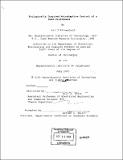Biologically inspired autoadaptive control of a knee prosthesis
Author(s)
Wilkenfeld, Ari (Ari Jacob), 1974-
DownloadFull printable version (8.404Mb)
Other Contributors
Massachusetts Institute of Technology. Dept. of Electrical Engineering and Computer Science.
Advisor
Gill A. Pratt.
Terms of use
Metadata
Show full item recordAbstract
This thesis describes the electronic control of a knee prosthesis for amputees. A microprocessor receives data from sensors, processes it and determines the proper level of rotary resistance for the joint. Control is maintained through one of two algorithms -- one for a system with sensors only for knee angle and axial force and one that also senses bending moment at the knee base. The electronic knee can control stance stability, adapt to walking cadence and detect stairs and standing modes, all advantages over the conventional mechanical knee. It will also allow flexion during stance- an important component of normal gait that most prostheses do not allow. Parameters for the knee are set automatically from observing the subject walk, rather then relying on the judgment of the prosthetist doing the fitting. As the subject moves, the output of the microprocessor changes and adapts to the actions of the subject, who might be walking faster, picking up a suitcase, or changing shoes. The algorithms were developed using five amputees with varying physical characteristics. Safety, comfort, and natural-appearing movement were considered in the project.
Description
Thesis (Ph.D.)--Massachusetts Institute of Technology, Dept. of Electrical Engineering and Computer Science, 2000. Includes bibliographical references (leaves 104-106).
Date issued
2000Department
Massachusetts Institute of Technology. Department of Electrical Engineering and Computer SciencePublisher
Massachusetts Institute of Technology
Keywords
Electrical Engineering and Computer Science.